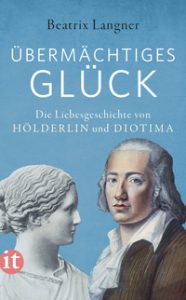Übermächtiges Glück
 Im Jahr 1796 trifft der Dichter Friedrich Hölderlin auf Suzette Gontard. Die Frau eines Frankfurter Bankiers suchte nach einem Hauslehrer für ihre vier Kinder. Diese Begegnung ist der Beginn einer leidenschaftlichen Liebesbeziehung.
Im Jahr 1796 trifft der Dichter Friedrich Hölderlin auf Suzette Gontard. Die Frau eines Frankfurter Bankiers suchte nach einem Hauslehrer für ihre vier Kinder. Diese Begegnung ist der Beginn einer leidenschaftlichen Liebesbeziehung.
Drei Jahre leben sie unter einem Dach, treffen sich heimlich, tauschen Briefe, zögern die unvermeidliche Trennung immer wieder hinaus. Als Suzette 1802 überraschend stirbt, stürzt dies den Dichter in eine Lebenskrise, von der er sich nie ganz erholen wird. Seiner großen Liebe setzt er in der Gestalt der Diotima in seinem Roman Hyperion oder Der Eremit in Griechenland ein Denkmal.
Mit Empathie und Genauigkeit erweckt Beatrix Langner die intensive Amour fou im Hause Gontard zum Leben, füllt sie mit Briefen, Tagebucheintragungen und Szenen aus dem Alltag und zeichnet so die dramatische Liebesgeschichte von Hölderlin und seiner Diotima nach.
Autorin
Beatrix Langner, geboren 1950 in Berlin, ist Literaturwissenschaftlerin, Kritikerin und Autorin zahlreicher literarischer Biografien, Essays, Hörspiele und Feuilletons.
Übermächtiges Glück
Autorin: Beatrix Langner
239 Seiten, TB.
Insel Verlag
Euro 12,00 (D)
Euro 12,40 (A)
sFr 17,90 (UVP)
ISBN 978-3-458-36472-6



